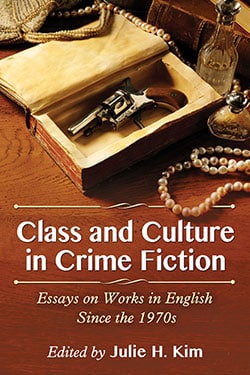Class and Culture in Crime Fiction
Essays on Works in English Since the 1970s
Original price was: $49.95.$24.99Current price is: $24.99.
In stock
About the Book
The crime fiction world of the late 1970s, with its increasingly diverse landscape, is a natural beginning for this collection of critical studies focusing on the intersections of class, culture and crime—each nuanced with shades of gender, ethnicity, race and politics. The ten new essays herein raise broad and complicated questions about the role of class and culture in transatlantic crime fiction beyond the Golden Age: How is “class” understood in detective fiction, other than as a socioeconomic marker? Can we distinguish between major British and American class concerns as they relate to crime? How politically informed is popular detective fiction in responding to economic crises in Scotland, Ireland, England and the United States? When issues of race and gender intersect with concerns of class and culture, does the crime writer privilege one or another factor? Do values and preoccupations of a primarily middle-class readership get reflected in popular detective fiction?
About the Author(s)
Bibliographic Details
Edited by Julie H. Kim
Format: softcover (6 x 9)
Pages: 240
Bibliographic Info: notes, bibliographies, index
Copyright Date: 2014
pISBN: 978-0-7864-7323-6
eISBN: 978-1-4766-1538-7
Imprint: McFarland
Table of Contents
Introduction: Class, Culture and Crime Beyond the Golden Age
Julie H. Kim 1
Morse, Frost and the Mystery of the English Working Class Neil McCaw 11
The Poet Dalgliesh and Kate from the Block: P.D. James’s Partners in Crime Janice Shaw 31
“Listen to the silence”: Dismantling the Myth of a Classless Society in the Fiction of Marcia Muller and Sara Paretsky Heath A. Diehl 49
In Poor Taste: Morality and Sue Grafton Suzanne Penuel 69
The Symbolic and the Semiotic of Class and Gender in Caleb Carr
Gretchen M. Cohenour 88
Denise Mina’s Feminist Detectives: Investigating the Crimes of Capitalist Patriarchy in The End of the Wasp Season Irmak Ertuna-Howison 104
Schemes, Overworlds and Spatial Justice in Black, Mina and Rankin
Peter Clandfield 125
Fables of Foreclosure: Tana French’s Police Procedurals of Recessionary Ireland Jean Gregorek 149
The Rising Tide of Neoliberalism: Attica Locke’s Black Water Rising and “The New Jim Crow” Ryan Poll 175
“Verticality is such a risky enterprise”: Class Epistemologies and the Critique of Upward Mobility in Colson Whitehead’s The Intuitionist
Tim Libretti 201
About the Contributors 225
Index 227





